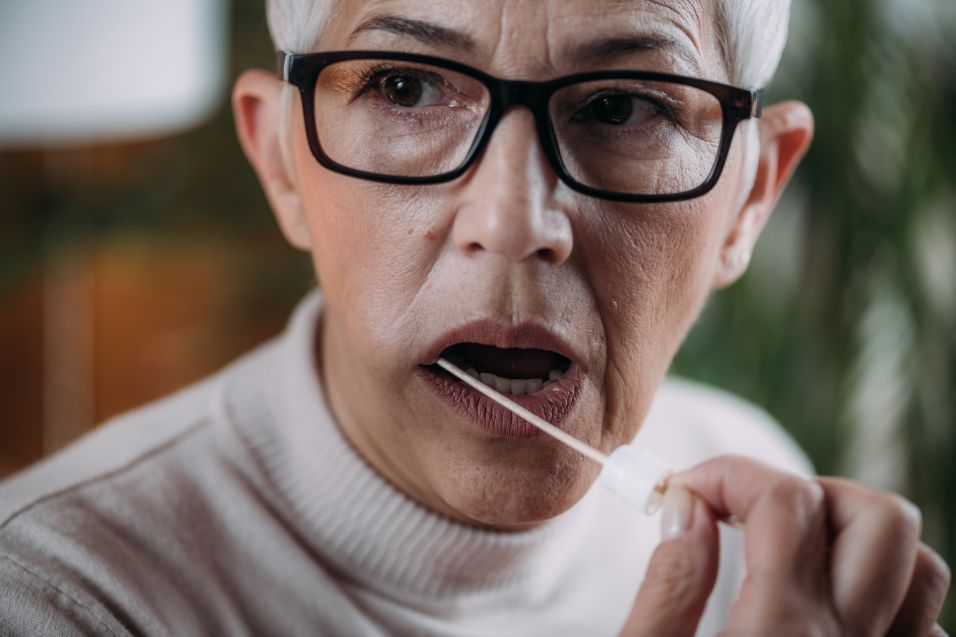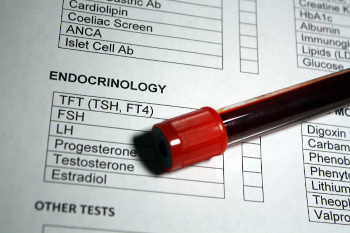The concept of “rough sex” has risen in the past decade, especially in young adults as they begin to explore their sexual self. This likely comes with increasing references in TV shows, movies, porn, books, popular music, and social media.
Sex Health Blog
The SMSNA periodically receives and publishes ‘guest editorials.’ The current article was submitted by Mia Barnes, a freelance writer and researcher who specializes in women's health, wellness, and healthy living. She is the Founder and Editor-in-Chief of Body+Mind Magazine
Sexual desire and function are often talked about in terms of hormones, stress or relationship dynamics. While all of those matter, they’re only part of the picture. An often-overlooked factor is metabolic health, which plays a quiet but influential role in sexual desire and function.
The best way to care for your cervix starts with learning all about it. The cervix is about an inch long and located 3-6 inches from the vaginal opening, depending on menstrual cycles and hormone changes. This tube-like structure is essential for reproduction because it allows microscopic sperm to enter the uterus, while protecting it from harmful bacteria and foreign objects. During childbirth, the cervix shortens to allow for easier labor.
The SMSNA periodically receives and publishes ‘guest editorials.’ The current article was submitted by Mia Barnes, a freelance writer and researcher who specializes in women's health, wellness, and healthy living. She is the Founder and Editor-in-Chief of Body+Mind Magazine
Electronic cigarettes (e-cigarettes) — also known as vapes — are often touted as a better alternative to traditional cigarettes. However, they still pose a significant risk to your health. For men, in particular, research shows that e-cigarettes raise the risk of erectile dysfunction.
Popular culture, television, and movies often focus on the culturally “taboo” topics, such as sex. For example, in the movie Mean Girls, Coach Carr teaches sex education, stating, “Don't have sex, because you will get pregnant and die!” While most adults understand that this is a funny line about abstinence, some viewers may believe this as true or misunderstand the joke.
With the rapid growth of the internet and digital technologies, access to healthcare and health information has become a lot easier in recent years. Between telecommunications, chat services, and educational resources, there are so many options available for patients to choose from when it comes to seeking care and medical advice. But how do we know what is trustworthy and safe to use?
If the concept of “aftercare” is foreign to you, you are likely not alone. Aftercare as depicted in popular movies and TV can often feel like a very “one or the other” type of deal. Either the couple is affectionate, or hygienic, with no in-between. However, in the past decade, social media platforms like Tik Tok and online fan content websites like Archive of Our Own or Wattpad have increased the visibility and conversation around aftercare as a totally normal and necessary aspect of anyone’s sex life. In fact, you may not even know that what you do after sex is considered aftercare!
The SMSNA periodically receives and publishes ‘guest editorials.’ The current article was submitted by Mia Barnes, a freelance writer and researcher who specializes in women's health, wellness, and healthy living. She is the Founder and Editor-in-Chief of Body+Mind Magazine
Sexual intrusive thoughts are characterized by extremely distressing sexual urges or visuals that the thinker may view as shameful or harmful. Sexual intrusive thoughts can be either paraphilic or non-paraphilic in nature:
Artificial intelligence (AI) is the simulation of human intelligence from computers. Believe it or not, AI has been developed and researched since the 1950s and has existed since the earliest computer – think Microsoft’s Clippy. Today, we see far more advanced forms of AI, which can be programmed to help with a variety of human-related tasks.
With the rise of the internet, more and more pornography (porn) is consumed every day. There is a concurrent rise in concern from non-healthcare professionals for the mental health and sexual function of those who consume it. Some internet-users describe “porn addiction,” also known as problematic porn consumption (PPC), as the culprit of their sexual dysfunction. Others say they feel insecure about their sexual abilities after comparing themselves with the individuals filmed in internet porn videos.
Cystic fibrosis (CF) is a genetic condition that causes thick mucus to build up in organs, which can block or damage their function. CF most commonly affects the lungs but can also cause cysts and scarring to occur in the pancreas, liver, sinuses, intestines, and reproductive organs. Complications of CF can include infections, malnutrition, diabetes, bone weakness, and reproductive health issues. Men with CF can struggle with fertility due to the absence of vas deferens, also known as congenital bilateral absence of the vas deferens (CBAVD). The vas deferens are tube-like organs that carry sperm from the testes to the ejaculatory duct. CF may also affect testicular production of testosterone, or hypogonadism, which can be found in up to 45% of men with CF.
The SMSNA periodically receives and publishes ‘guest editorials.’ The current article was submitted by Mia Barnes, a freelance writer and researcher who specializes in women's health, wellness, and healthy living. She is the Founder and Editor-in-Chief of Body+Mind Magazine.
Talking about sexual health with your doctor can feel awkward and even nerve-wracking. However, these conversations are a vital part of your overall well-being. Whether you’re dealing with performance concerns, pains, STIs, low libido or changes due to aging, your provider is trained to help without judgment.
Varicoceles are considered a common disorder that happens when the veins in the scrotum become enlarged. While 15-20% of US males are affected, varicoceles are typically painless and often unnoticeable. If noticeable, they may present as swollen testicles, or produce dull pains or aches in the scrotum or groin. The enlarged veins may make the scrotum feel like a bag of worms.
The SMSNA periodically receives and publishes ‘guest editorials.’ The current article was submitted by Mia Barnes, a freelance writer and researcher who specializes in women's health, wellness, and healthy living. She is the Founder and Editor-in-Chief of Body+Mind Magazine.
Vaginal dryness is often thought of as a problem that only affects women after menopause — but that’s not the whole story. While it’s true that hormonal changes can lead to dryness and discomfort, especially during sex, women of all ages can experience this issue. It’s more common than you think and can affect your comfort, confidence and relationships. The good news is that it’s treatable. Explore what causes vaginal dryness and why it isn’t just a post-menopausal problem.
According to recent research, approximately 52% of women have reported faking an orgasm at least once in their lifetime. The most common reason provided for why women may fake orgasms has historically been embarrassment – whether on their behalf or on their partner’s behalf. As an example, 78% of women in relationships have reported faking orgasm in order to avoid conflict with or spare the feelings of their partner, while around 47% have faked it just to please their partner. However, women may also fake an orgasm because of boredom, exhaustion, or inability to orgasm in the moment, either because of intoxication, anorgasmia (distressing inability to orgasm), or other interferences. On some occasions, faking an orgasm can be a way to heighten arousal and make for a more intense and satisfying final orgasm.
The SMSNA periodically receives and publishes ‘guest editorials.’ The current article was submitted by Mia Barnes, a freelance writer and researcher who specializes in women's health, wellness, and healthy living. She is the Founder and Editor-in-Chief of Body+Mind Magazine.
The debate on sleeping next to your partner and having separate rooms or beds feels never-ending. Sharing the same space feels like a natural option, especially for long-term relationships. However, others may prefer the peace of sleeping alone.
Orgasms are often considered the peak of sexual pleasure, but not everyone experiences them easily. While some people reach orgasm consistently, others may struggle due to a combination of biological, psychological, and social factors. Understanding how orgasms work and why some people have difficulty achieving them can help normalize these experiences and provide solutions.
One’s mental and emotional health is just as important as their physical health when it comes to their sexual functioning. This is why urologists and urogynecologists often work collaboratively with sex therapists to offer their patients comprehensive care by addressing both the physiological and psychological aspects of sexual dysfunction. While a urologist focuses on managing medical conditions, a sex therapist can help patients navigate the emotional and psychological challenges associated with sexual dysfunction, such as performance anxiety, relationship conflicts, or trauma-related concerns.
The SMSNA periodically receives and publishes ‘guest editorials.’ The current article was submitted by Mia Barnes, a freelance writer and researcher who specializes in women's health, wellness, and healthy living. She is the Founder and Editor-in-Chief of Body+Mind Magazine.
Though vaginal dryness is a natural part of aging, many misconceptions surround it, causing unnecessary worry and ineffective self-treatment strategies. Today, we’ll disprove six prevalent myths about this common issue and explain what you can do if it affects your quality of life.
Sexual intimacy is a deeply personal and unique experience that varies from relationship to relationship. For individuals in nonbinary relationships – where one or both partners identify outside the traditional categories of male and female – intimacy can involve unique challenges and opportunities. Understanding these dynamics can foster healthier relationships, better communication, and greater satisfaction.
The SMSNA periodically receives and publishes ‘guest editorials.’ The current article was submitted by Mia Barnes, a freelance writer and researcher who specializes in women's health, wellness, and healthy living. She is the Founder and Editor-in-Chief of Body+Mind Magazine.
Dehydration is a common issue many overlook, but its impact on overall health can be significant. One area it can affect — often without people realizing — is sexual health. Erectile dysfunction (ED) is just one of the ways dehydration can affect your sexual wellness.
Androgen deprivation therapy (ADT) is a common treatment for prostate cancer, aiming to lower levels of male hormones (androgens) such as testosterone, which can stimulate the growth of prostate cancer cells. While ADT can effectively slow the progression of prostate cancer, it often brings about a range of side effects due to the drastic reduction of testosterone in the patient’s body. Below, some of the most common side effects of ADT are discussed, as well as their impact on patients’ lives.
The SMSNA periodically receives and publishes ‘guest editorials.’ The current article was submitted by Mia Barnes, a freelance writer and researcher who specializes in women's health, wellness, and healthy living. She is the Founder and Editor-in-Chief of Body+Mind Magazine.
Bereavement is an intense emotional experience. It can trigger a range of negative emotions, such as confusion, denial, sadness and anxiety — as well as changes in libido and emotional intimacy. While each journey through grief is different, understanding its impact on your relationship with your partner can help you manage the pain better.
Gender-affirming care refers to a range of medical, psychological, and social support services designed to help transgender individuals align their physical appearance with their gender identity. This comprehensive approach may include hormone therapy, surgery, and mental health support, all aimed at improving the well-being of transgender individuals. One significant area of impact is sexual satisfaction, which can be profoundly influenced by gender-affirming care.
The SMSNA periodically receives and publishes ‘guest editorials.’ The current article was submitted by Mia Barnes, a freelance writer and researcher who specializes in women's health, wellness, and healthy living. She is the Founder and Editor-in-Chief of Body+Mind Magazine.
Feeling like you can’t control your body is frustrating, especially if you’re struggling to reach orgasm. Although there could be many reasons why you can’t climax, your mental health may be one of the leading causes. Learn more about how overthinking can lead to orgasmic dysfunction and you’ll potentially find some solutions that give you peace of mind.
Pelvic floor exercises, also known as Kegel exercises, are designed to strengthen the muscles that support the bladder, uterus, rectum, and other pelvic organs. These exercises are often associated with improving bladder control, but they also have a significant impact on sexual health for both men and women. By improving muscle tone in the pelvic region, pelvic floor exercises can lead to enhanced sexual function, improved orgasms, and greater sexual satisfaction.
Managing mental health and sexual health simultaneously is important because both aspects are closely intertwined. Taking care of both can enhance your overall quality of life. The following will explore how mental health impacts sexual health and vice versa, and share strategies on how to manage both together.
Hepatitis is a group of viral infections that primarily affect the liver, leading to inflammation and other complications. The three most common types of hepatitis are hepatitis A, B, and C. While each type has different modes of transmission, sexual activity can be a significant route for spreading hepatitis B (HBV) and, to a lesser extent, hepatitis C (HCV). Understanding the risks of transmitting hepatitis during sexual activity is crucial for both prevention and management.
Asexuality is a term that has gained increasing visibility in recent years, yet it remains widely misunderstood. This article aims to clarify what asexuality is, dispel common myths, and provide a comprehensive understanding on this topic.
Recent research suggests that medications commonly used to treat erectile dysfunction (ED) may also help reduce one’s risk of developing Alzheimer’s disease. This revelation comes from a large study conducted at University College London in the United Kingdom, which tracked the health records of about 270,000 men over several years.
The SMSNA periodically receives and publishes ‘guest editorials.’ The current article was submitted by Mia Barnes, a freelance writer and researcher who specializes in women's health, wellness, and healthy living. She is the Founder and Editor-in-Chief of Body+Mind Magazine.
First things first — There's no such thing as a permanently "loose" or "tight" vagina. Your vagina is elastic, capable of accommodating childbirth and returning to its former shape. While aging and childbirth may weaken vaginal walls, it's not a permanent condition. Explore how vaginal composition can change and how to maintain pelvic floor health for optimal well-being.
The prostate gland may not be something men think about often, but it plays an important role in both urinary and sexual health. Understanding how the prostate functions and the impact it can have on sexual function is essential for men of all ages.
The SMSNA periodically receives and publishes ‘guest editorials.’ The current article was submitted by Mia Barnes, a freelance writer and researcher who specializes in women's health, wellness, and healthy living. She is the Founder and Editor-in-Chief of Body+Mind Magazine.
You can likely tell a cold sore is forming when you feel a tingling or sharp pain around your lips and mouth. Although not dangerous, they are common but bothersome blisters. Here is an overview of cold sores, the most typical symptoms, and how to prevent them from reoccurring.
The SMSNA periodically receives and publishes ‘guest editorials.’ The current article was submitted by Mia Barnes, a freelance writer and researcher who specializes in women's health, wellness, and healthy living. She is the Founder and Editor-in-Chief of Body+Mind Magazine.
A yeast infection is one of the worst ways to ruin a good time in bed. However, some wonder if their infection resulted from sex in the first place.
Vulvodynia is a condition characterized by chronic pain or discomfort in the vulva, the external genital area of women, with no clear identifiable cause. This condition can significantly impact a person’s quality of life, negatively affecting their physical comfort, emotional wellness, and sexual satisfaction. While vulvodynia is relatively common, it remains poorly understood, often leading to misconceptions and challenges in diagnosis and treatment.
The SMSNA periodically receives and publishes ‘guest editorials.’ The current article was submitted by Mia Barnes, a freelance writer and researcher who specializes in women's health, wellness, and healthy living. She is the Founder and Editor-in-Chief of Body+Mind Magazine.
Interactions happen when medicines, foods or herbal remedies change the way substances act in the body when taken at the same time. One drug may make the other less or more effective. For instance, some of the meds you’re taking may be messing with your birth control pills, which is troublesome if you’re not ready to get pregnant. Below are eight medications you should avoid or replace if you’re on contraceptives.
Libido, often referred to as one’s sexual desire or drive, is a complex aspect of human sexuality that can fluctuate throughout life. Questions are often raised about what is considered “normal” regarding varying levels of sexual desire and how individuals can navigate these fluctuations. Understanding the variability of libido over time requires a nuanced exploration of the biological, psychological, and social factors that are at play.
Intimacy, both physical and emotional, is a cornerstone of human connection. However, for individuals who have experienced trauma, navigating intimacy can be a complex and challenging journey. Trauma can profoundly impact one’s ability to trust, feel safe, and engage in healthy relationships. Yet, with patience, self-compassion, and support, it is possible to reclaim intimacy and cultivate fulfilling connections. This article explores strategies for navigating intimacy after experiencing trauma, drawing from psychological research and therapeutic approaches.
The SMSNA periodically receives and publishes ‘guest editorials.’ The current article was submitted by Mia Barnes, a freelance writer and researcher who specializes in women's health, wellness, and healthy living. She is the Founder and Editor-in-Chief of Body+Mind Magazine.
Among the types of sexually transmitted diseases, the human papillomavirus (HPV) is the most prevalent. While most of these infection cases carry low risks without emerging symptoms, some virus strains can lead to cancer. Here are five surprising facts you might have missed about HPV.
Effective communication is the cornerstone of any healthy relationship, and this principle extends to the intimate aspects of a partnership. Addressing and expressing one’s sexual needs, desires, and boundaries is an important component of maintaining a satisfying and fulfilling connection with a partner. The following strategies can be used to improve communication around sex, cultivating a deeper understanding between partners.
Sex therapy is a specialized form of counseling aimed at addressing sexual concerns and improving intimacy for individuals or couples. It provides a safe and confidential space for people to discuss their sexual issues and work towards achieving a healthier, more fulfilling sexual life. Understanding the common reasons why individuals seek sex therapy is essential in destigmatizing the process and encouraging open conversations around sexual well-being. The following are some reasons why people may pursue sex therapy.
Erectile dysfunction (ED) is a prevalent condition that affects millions of men worldwide, impacting their quality of life and relationships. The question of whether ED is reversible is a crucial one, as it holds implications for the treatment and well-being of those affected. In this article, we will delve into the various factors contributing to ED and explore the potential for its reversal.
Sexual health education is a critical component of a comprehensive education that equips young people with the knowledge and skills to make informed decisions about their sexual and reproductive health. For LGBTQIA+ (Lesbian, Gay, Bisexual, Transgender, Queer, Intersex, Asexual, and other identities) youth, there are specific considerations that educators and policymakers must address to ensure inclusivity and relevance in sexual health education programs.
Movember is an Australian charity that dedicates the month of November to raising awareness about men’s health issues such as prostate cancer, testicular cancer, and men’s mental health.
If you have engaged in and enjoyed sexual activity but never had an orgasm, you’re not alone. Sexual satisfaction and well-being are important aspects of human life. While discussions about sex often revolve around pleasure, it’s crucial to acknowledge that not everyone experiences sexual satisfaction in the same way.
Do you find yourself with a lack of sexual desire, which is bothersome to you? This could be a symptom of HSDD.
The SMSNA periodically receives and publishes ‘guest editorials.’ The current article was submitted by Mia Barnes, a freelance writer and researcher who specializes in women's health, wellness, and healthy living. She is the Founder and Editor-in-Chief of Body+Mind Magazine.
Having sex while you experience menstrual cramps is healthy and can provide significant benefits. While it might not be the first activity that comes to mind when your PMS or period cramping begins, many people enjoy sex to reduce menstrual cramps, experience increased pleasure and benefit from other advantages. Learn more about having sex while menstrual cramps are happening and how it can help your body.
Priapism is a long-lasting (>4 hours), unwanted erection that is not related to sexual stimulation. There are two types of priapism: low-flow (ischemic) priapism and high-flow (non-ischemic) priapism. Ischemic priapism is caused by a situation in which blood is unable to leave the penis, while non-ischemic priapism is generally caused by injury to an artery that may increase blood flow to the penis.
Mental health and sexual health are closely tied to one another, so perhaps it is not surprising that psychiatric disorders can have an impact on a person’s sexual health. Multiple studies that have addressed psychiatric disorders and sexual dysfunction have unearthed higher rates of sexual dysfunction in people with depressive disorders, anxiety disorders, obsessive-compulsive disorder (OCD), and schizophrenia.
Whether we realize it or not, we are constantly sensing and processing signals from our bodies. For example, we may be consciously or subconsciously aware of our heartbeat, breathing, hunger, thirst, temperature (i.e., feeling too hot or too cold), or our need to go to the bathroom. The process of perceiving these body cues to better understand the state of the body is known as interoception.
Gender-affirming care is a term that covers an array of health care services and other interventions aimed at supporting and affirming an individual’s gender identity when it does not align with the gender they were assigned based upon their apparent sex at birth. This can include social, behavioral, medical, and psychological options.
Often, people hear about the risks associated with sexual activity such as sexually transmitted infections (STIs) or unplanned pregnancy. However, consensual sex also has numerous health benefits that have been supported by scientific evidence. The following are just a few health benefits that have been associated with sex.
The landscape of information sharing has changed dramatically over the last several decades. Whereas individuals once got their information via textbooks, newspapers, encyclopedias, and word of mouth, almost all information is now obtained online.
Sex therapy is a specialized form of psychotherapy aimed at helping individuals and couples overcome their sexual difficulties utilizing behavioral, cognitive, and psychodynamic principles. Sexual dysfunction can be caused by a medical condition, medications, or a physical issue, but it can also be caused by and/or compounded by related mental health issues or relationship problems.
A person’s gender identity refers to their inner sense of self with regard to their gender. One might identify as a man, a woman, a combination of genders, or no gender at all.
Smoking cigarettes has long been considered an important independent risk factor for erectile dysfunction (ED). Nevertheless, approximately one-third of men worldwide are active smokers, and many are unaware that smoking can contribute to ED.
The cervix is the lower, narrow part of the uterus. It is the passageway between the uterus and the vagina, allowing for sperm to enter the uterus for conception, sealing the womb during pregnancy, and widening (dilating) to allow the baby to pass through the birth canal during childbirth.
The SMSNA periodically receives and publishes ‘guest editorials.’ The current article was submitted by Mia Barnes, a freelance writer and researcher who specializes in women's health, wellness, and healthy living. She is the Founder and Editor-in-Chief of Body+Mind Magazine.
Depression is all-encompassing and multi-faceted. Although its symptoms are similar across the board, they can also vary by individual. The way depression manifests is unique and personal — much like sex. Depression can affect every aspect of your life, including your sexual function.
Sex has many physical and emotional benefits. In most cases, it is supportive of good cardiovascular health. It can also improve a person’s mood, enhance their connection with their partner, and improve their overall quality of life. As such, people may be understandably motivated to remain sexually active for as long as it is safe and does not pose a danger to their health.
Prostate cancer and its treatments can result in discouraging sexual health changes for both patients and their partners. Radical prostatectomy, a surgery to remove the prostate and some of the surrounding tissues, can result in erectile dysfunction (ED), altered penile sensation, changes in orgasm, penile shortening, and possible incontinence during sexual activity.
Pansexuality refers to sexual, emotional, or romantic attraction to people regardless of their gender identity or sex. A person who is pansexual may be attracted to some people and not others, but the gender or sex of the people who they are attracted to does not matter.
A sexually transmitted disease (STD), also known as a sexually transmitted infection (STI), can be passed through vaginal, oral, or anal sex. Anyone who has sex can be exposed to and become infected with an STI.
Spinal cord injuries (SCI) can lead to changes in a person’s sexual health. Depending on the severity of the injury and its location on the spine, it can lead to a loss of motor function, the inability to perceive touch or respond to stimuli, and/or the decline or absence of sexual response reflexes.
Currently, the research on the effects of vitamins and vitamin deficiencies on sexual health is very limited. Nevertheless, given that vitamins are organic compounds that are essential for normal growth and for regulating bodily functions, it follows that a person’s vitamin levels could affect their sexual functioning as well. The following is what is known thus far about vitamins and their potential impact on sexual function.
Chemsex is a form of sexualized drug use for which participants take recreational drugs to enhance, extend, or strengthen a sexual experience.
Penile Mondor’s Disease (PMD) is a rare condition that involves thrombophlebitis (inflammation of the veins that can lead to blood clots) in the penis. Usually, it occurs in the superficial dorsal vein, which is located along the top of the penis. While it can be aggravating, PMD is not a serious or harmful disorder, and it generally resolves on its own.
Perhaps unsurprisingly, many people are hesitant or even reluctant to seek help for sexual problems. In fact, several population-based studies have demonstrated that just up to one-third of people experiencing a sexual health issue consult a medical professional and sometimes even less than that, depending on the region and other circumstances.
Although sex and sleep may seem unrelated, the quality and consistency of a person’s sleep can actually have a big impact on their sex life. The following is a quick reference guide on the ways that sleep can affect a person’s sexual function and satisfaction, as well as ideas for improving your sleep habits and, hopefully, your sex life by extension.
Erectile dysfunction (ED) is the inability to get or maintain an erection that is firm enough for satisfactory sexual activity. Many men are affected by ED, and it becomes more common as men age because of its relation to other health conditions, certain medications, and the natural decrease in a man’s testosterone levels as he gets older.
A person’s sexual desire will naturally fluctuate over the course of their lifetime, increasing in some periods and decreasing in others. However, if an individual finds that they are consistently lacking desire and are generally uninterested in sex, they may have hypoactive sexual desire disorder (HSDD).
Locally advanced cervical cancer (LACC) can be treated with chemoradiotherapy (CRT) or neoadjuvant chemotherapy (NACT) and radical hysterectomy (RH), and there is much debate about which treatment strategy is best for preserving individuals’ sexual functioning and quality of life. CRT has demonstrated drawbacks when it comes to cancer patients’ sexuality and quality of life, but less is known about the long-term effects of NACT-RH as a treatment for LACC.
Polycystic ovary syndrome (PCOS) is a condition that can affect women of reproductive age. Women with PCOS experience a hormonal imbalance that can cause irregular, infrequent, or prolonged periods, acne, increased facial and body hair, and sometimes infertility.
Endometriosis is a condition that affects women who have menstrual periods and can cause painful intercourse, heavy periods, and infertility, among other symptoms. It occurs when tissue similar to the tissue that lines the uterus (the endometrium) begins to grow outside of the uterus. Because this tissue behaves like the endometrium, it thickens and breaks down each month during a woman’s menstrual cycle, just like the tissues in her uterus. However, because it does not have a means of exiting the body, it irritates the surrounding tissues, creating scar tissue, causing pelvic pain, and sometimes resulting in cysts and/or adhesions (the term for when separate organs become stuck together).
The idea of seeing a sex therapist may seem intimidating, but it can be a practical, low-risk step toward improving your sex life. People go to sex therapy for many different reasons, but the goal of any sex therapy session is fundamentally the same. Sex therapy seeks to identify and address any biological, psychological, interpersonal, or other life factors that may be impacting sexual satisfaction so that individuals and couples can move past these challenges and have a fulfilling sex life.
Contrary to what it may say on the internet, there is no magic food or supplement that can prevent erectile dysfunction (ED). Even so, diet and other lifestyle factors can play a role in contributing to or protecting against developing ED. The following are the ways in which a person’s diet may affect their likelihood of acquiring this condition.
Fecal incontinence, or the involuntary leakage of stool, is an anorectal dysfunction that can affect men and women of all sexual orientations. Though it is a condition that can negatively impact a person’s quality of life, it is thought to be underreported due to patients’ embarrassment and the historically taboo nature of the topic.
Congenital penile curvature (CPC) and Peyronie’s disease (PD) are two conditions which can lead to penile curvature. Although the curvature itself may appear similar at times, the two conditions are very different in many ways. In men with CPC, curvature is often first noted during the teenage years. It is currently not known if the condition is present since birth in all cases, or if it develops during puberty in some men. Congenital penile curvature is a rare condition that is estimated to affect less than 1% of men.
Most health care providers in a urologic practice are well aware that urologic conditions and sexual issues often go hand in hand. Conditions such as urologic cancers and lower urinary tract symptoms can impact a person’s sexual function, sexual desire, and ability to enjoy sex. Even so, a recent study of urologic oncologists revealed that 75% of the providers surveyed did not routinely address their patients’ sexual function during visits.
Lichen sclerosus is a rare skin condition that usually occurs in the genital or anal area. It creates white, patchy areas of skin that may be thinner and tighter than other areas of skin. Skin affected by lichen sclerosus is often more susceptible to bruising and tearing, which can lead to painful sex when it is located on the genitals.
Post-traumatic stress disorder (PTSD) is a psychiatric condition that can be brought on by witnessing or experiencing a traumatic event like a serious accident, physical or sexual assault, or war and conflict. It is often characterized by intrusive, distressing memories, flashbacks, or nightmares about the event; avoidance of people, places, or things that remind one of the event; heightened emotional and physical reactions to stimuli; and negative changes in mood or thinking.
Past research has indicated that eating disorders and sexual disorders are more prevalent in women than in men. Moreover, eating disorders and sexual disorders have been shown to co-occur in individuals, meaning that a person can have both conditions at the same time. (When two or more medical conditions occur in an individual at the same time, they are known as comorbid conditions).
Those who believe that sex ceases to play a significant role in people’s lives as they age may want to reconsider their opinion. A 2017 national survey of senior citizens conducted at the University of Michigan revealed that 40% of men and women between the ages of 65 to 80 are still having sex. For those who were in relationships, this rate rose to 54%. Sixty-one percent of the survey participants indicated that sex is still an important factor in their quality of life.
Erectile dysfunction (ED) and female sexual dysfunction (FSD) are complex conditions that negatively impact one’s ability to experience satisfying, consensual sexual activity. A person’s sexual function can be influenced by physical and psychological factors, so ED/FSD often occur at the same time as other medical conditions such as diabetes mellitus, high blood pressure, cardiovascular disease, and depression.
A woman’s body undergoes several major changes over the course of her lifetime, many of which can have an impact on her sexual health and overall wellbeing. For example, when a woman enters menopause, her estrogen levels and those of her other steroid hormones decrease. This can lead to changes in her vulvar and vaginal tissues that can result in vaginal dryness, less vaginal elasticity, and burning or pain during sexual intercourse – a condition known as vulvo-vaginal atrophy (VVA)/genitourinary syndrome of menopause (GSM).
Interstitial cystitis (IC) is a chronic condition that causes pain, pressure, and/or discomfort in the bladder. Although IC is not caused by an infection, its symptoms may feel like a bladder infection. To be considered IC, symptoms must persist for at least six weeks. Sometimes, when a person is experiencing bladder pain but there are no visible abnormalities in the organ, the condition is referred to as painful bladder syndrome (PBS). Together, IC and PBS are classified under the umbrella term: bladder pain syndrome (BPS).
The SMSNA periodically receives and publishes ‘guest editorials’ by sexual medicine specialists. The current article was submitted by Mark Goldberg, LCMFT, CST, a certified sex therapist and SMSNA member who specializes in sexual medicine in Maryland and hosts the Erectile Dysfunction Radio Podcast. The content has been reviewed by the SMSNA Website Committee for accuracy.
Erectile dysfunction (ED) is a complex medical condition which includes both physical and mental components. The paradigm of what causes ED and how it is treated has shifted over the past 50 years from a mental focus to a physical one.
There are several factors to consider when it comes to finding a provider who is knowledgeable about transgender health care needs and who can support transgender patients by providing high-quality gender-affirming care, primary care, or other specialty care. Dr. Maurice Garcia, transgender surgeon and director of the Cedars-Sinai Transgender Surgery and Health Program, and Dr. Sheryl Kingsberg, psychologist and chief of the division of behavioral medicine at MacDonald Women's Hospital/University Hospitals Cleveland Medical Center, shared advice for transgender patients on this topic.
According to a new study in The Journal of Sexual Medicine, having a partner may protect against depression in men with Peyronie’s disease, while a history of depression and higher Peyronie’s Disease Questionnaire (PDQ) scores may be predictive of depression.
As anyone who has ever tried to navigate health care coverage can attest, it is all too often a frustrating, fruitless endeavor characterized by multiple phone calls, numerous transfers, and invariably long hold times. This cumbersome process creates an obstacle for those seeking medical treatment and may disproportionately affect transgender individuals seeking treatment for gender dysphoria.
For individuals suffering from a condition that affects their sexual function, receiving an accurate diagnosis is an important first step in the process of pursuing treatment. This may seem simple, but unfortunately, many sexual disorders have overlapping symptoms and manifest themselves in similar ways, sometimes making it difficult to identify the root of the problem. Stuttering priapism (SP) and sleep-related painful erection (SRPE) are two rare disorders that have similar symptoms and can cause painful erections at night, but they are distinct conditions that should be managed and treated in different ways.
Hard flaccid syndrome (HF) is a sexual disorder that has not yet been formally recognized and defined by the sexual medicine community. Nevertheless, internet forums, chat groups, and social media groups have formed to support patients who suffer from the symptoms of this disorder, indicating that it is a relevant condition that affects one’s health and sexual function.
Concealed penis (also known as buried or hidden penis) is a condition in which the penis is partially or fully covered by the skin of the abdomen, thighs, or scrotum and does not fully protrude from the body. Unlike micropenis, a concealed penis is typically average in length but hidden under skin. It is an uncommon condition that can be congenital (present at birth) or acquired later in life.
For women who suffer from chronic pelvic pain due to endometriosis, non-coital sexual activities such as petting and oral sex may provide an effective alternative to penile-vaginal sex for reaching orgasm and achieving a more satisfying sex life. In a recent study that surveyed 868 women from Switzerland, Germany, and Austria (434 women with endometriosis and 434 women who were part of a control group), researchers found that although the women with endometriosis were less likely than those in the control group to reach orgasm during sexual intercourse, there was no significant difference in orgasm rates during masturbation and non-coital partnered activities between the two groups of women.
When you’re finished with cancer treatment, you might feel relieved and excited to start a new chapter in your life. It can be a hopeful time.
WHAT WILL THE CHEMO/RADIATION/SURGERY DO TO PARTS OF MY BODY THAT HAVE NOTHING TO DO WITH THE CANCER?
CAN YOU TELL US, HONESTLY, HOW TREATMENT MIGHT AFFECT OUR SEXUAL FUNCTION?
On SexHealthMatters, we often discuss how cancer and its treatment affect one’s sexual health. (See the links at the bottom of this post to learn more.) Often, a supportive partner plays an important role in sexual recovery after cancer. Usually, the partner has been there from the beginning and has some idea of what to expect going forward.
Sex can be especially exciting when you’re trying to start a family. You and your partner can enjoy your time together, bond as a couple, and smile to yourselves, wondering if your most recent bedroom encounter will result in a new family member nine months from now.
Mention a penile implant to a man with erectile dysfunction (ED), and you might get a squeamish look. The idea of having surgery on his private parts is likely to make any man squirm. And, naturally, there are questions. Will the implant work? Will there be complications? Will sex feel the same? What do partners think?
How do healthcare professionals make decisions when diagnosing and treating illnesses? Certainly, their continuing medical education helps, and most attend conferences and keep up with research in their field’s peer-reviewed journals.
If you’re a woman going through cancer treatment, you’ve probably had to adapt to a lot of changes in your life. You might have seen some dramatic changes in your sex life, too – changes you might not have been prepared for.
After a cancer diagnosis, it’s not unusual to have questions swirling through your mind. How far has the cancer progressed? What is the prognosis? What will treatment be like? How will my family and I cope?
The American Urological Association (AUA) is a professional organization for urologists. Founded in 1902, the organization now has over 21,000 members. One of its many roles is to provide guidelines on various aspects of urologic health so that doctors can best serve their patients.
You and your partner probably have a lot in common. Or if you’re not partnered, you likely seek common traits in a prospective mate. Whether it’s a love of baseball, camping, or rock concerts, these commonalities help keep you close as a couple.
Like many aspects of sex, orgasms are always changing. You might have one night of passion that feels like an out-of-body experience. You might have another that is pleasant, but not necessarily powerful. And you might have another that is just humdrum. Should you worry?
Back in December, we started covering an interesting Finnish study about women’s orgasms. A team of researchers compiled the results of five different sex surveys taken over four decades starting in the early 1970s. Over 10,000 men and women participated, and the researchers focused on women’s orgasms. They published their findings in October 2016 in the journal Socioaffective Neuroscience and Psychology.
In August 2017, the European Journal of Cancer Care published a comprehensive review by Canadian researchers that involved over 100 medical studies concerning women, cancer, and sexual health. The authors delved into the physical and psychological aspects of cancer that can affect sexuality. They also discussed some of the ways patients and their healthcare team might approach sexual problems during and after cancer treatment.
For most people, enjoyable sex is sex without pain. But even small discomforts can make sex less pleasurable. While sexual pain can have many causes, the clue to resolving it can start with our mindset.
Earlier this year, the American Cancer Society estimated that about 15 million Americans were living with cancer in 2016.
Orgasm is sometimes described as an out-of-the-body experience. We’d add that it’s a full-body experience, too. Think about the body parts involved: Your eyes see your partner’s smile; your skin receives touch. Your brain sends signals through your nervous system, telling your genitals to start getting ready for the main event. Your blood pumps harder. Your breathing quickens. And then, if things go as planned, you and your partner climax – sometimes together, but more often separately.
Here on SexHealthMatters we often talk about the role of the brain during sexual activity. While the genitals may seem more involved with the “action,” the brain is a great coordinator. It takes in sexual stimuli (like a provocative smile or a touch), processes them, and sends messages to the genitals to start getting ready, either through erection or vaginal lubrication.
Would it surprise you to learn that an estimated 10% to 40% of women have trouble reaching orgasm? And that some women have never had an orgasm at all?
A dry orgasm?
For men, it sounds like a contradiction, doesn’t it? Men ejaculate semen at orgasm. Doesn’t that make orgasms, by definition, wet?
When his doctor mentioned the prostate biopsy, Stan’s heart sank. What did this mean? Did he have cancer? And if so, how would his life change?
An erection is a complex process. It may not seem that complicated – a man can be sexually turned on by his partner’s smile, an erotic fantasy, or a beautiful person who passes him on the street. An erection might even seem automatic.
Orgasm is a complex, mysterious process. But that hasn’t stopped scientists from trying to learn as much as they can. In fact, some volunteers have brought themselves to orgasm inside an MRI machine in the name of science.
As we get older, it’s inevitable that our bodies change. Our hair might turn gray, our skin may become wrinkled, and we might put on a little weight. These are changes we can usually expect.
Justin was the new guy at the office and he was looking forward to the company’s annual summer party, always held at the boss’s ritzy estate by the ocean. These parties were legendary, he’d been told. People from all over the region came to play volleyball on the beach, have bonfires after the sun went down. And it wasn’t uncommon for couples to wander off, claiming that what happens at the party stays at the party.
If you or someone you care about has been diagnosed with prostate cancer, it can be an unsettling time. There’s so much to learn while you cope with feelings of uncertainty and anxiety.
Men, have you ever had your testosterone levels checked?
Considering the media buzz about testosterone these days, many men wonder if they should.
Two weeks ago on the SexHealthMatters blog, we discussed three types of drugs that can decrease a person’s sex drive: antidepressants, birth control pills, and finasteride (a drug that can treat an enlarged prostate or male-pattern hair loss.)
When your sex drive plummets, it can be difficult to pinpoint why. Could it be low testosterone? Fluctuating hormones due to pregnancy or menopause? Fatigue or stress from a new job? Anxiety or depression? All of these factors can contribute to low libido. So can certain medical conditions like diabetes and cancer.
Greg was losing his interest in sex and he couldn’t figure out why.
Maria looked in the mirror and was troubled by what she saw.
You may also be interested in...
Other Popular Articles

What Is the Average Penis Size?
If you have ever wondered how your penis compares to others in terms of size, you are not alone. Many men are curious to know how their penises stack up compared to the average. Unfortunately, general curiosity can sometimes give way to full-on obsession and anxiety about penis size. This can be an unhealthy and often unnecessary fixation, especially because most men who think their penises are too small have perfectly normal-sized penises.

What Is Jelqing, and Does It Actually Work?
The term “jelqing” refers to a set of penis stretching exercises that some believe can make the penis bigger. Although the practice has gained attention and popularity in blogs and internet forums in recent years, there is no scientific evidence that it is an effective way to permanently increase the size of one’s penis. In fact, in some cases, jelqing may actually cause damage to the penis, so it is a good idea to get all the facts before setting off to try it.

What Is Sensate Focus and How Does It Work?
Sensate focus is a technique used to improve intimacy and communication between partners around sex, reduce sexual performance anxiety, and shift away from ingrained, goal-oriented sexual patterns that may not be serving a couple.

Can Sex Reduce Menstrual Cramps?
The SMSNA periodically receives and publishes ‘guest editorials.’ The current article was submitted by Mia Barnes, a freelance writer and researcher who specializes in women's health, wellness, and healthy living. She is the Founder and Editor-in-Chief of Body+Mind Magazine.
Having sex while you experience menstrual cramps is healthy and can provide significant benefits. While it might not be the first activity that comes to mind when your PMS or period cramping begins, many people enjoy sex to reduce menstrual cramps, experience increased pleasure and benefit from other advantages. Learn more about having sex while menstrual cramps are happening and how it can help your body.

How Long Does It Take the Average Man to Ejaculate?
On average, it takes a man between 5 to 7 minutes to orgasm and ejaculate during sexual intercourse.

Can Sex Throw off Your Vaginal pH Balance?
The SMSNA periodically receives and publishes ‘guest editorials.’ The current article was submitted by Mia Barnes, a freelance writer and researcher who specializes in women's health, wellness, and healthy living. She is the Founder and Editor-in-Chief of Body+Mind Magazine.
Your vagina is a pretty powerful organ. It is a pathway for menstrual blood and babies. It also is a main player in sexual intercourse. You might hear about your vagina’s pH and worry that yours is at risk. Here’s what to know about vaginal pH, including the impacts sex could have.
You are prohibited from using or uploading content you accessed through this website into external applications, bots, software, or websites, including those using artificial intelligence technologies and infrastructure, including deep learning, machine learning and large language models and generative AI.



























































































































